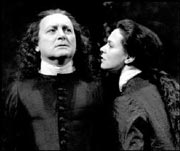HANG ON DURING the first act of the Marivaux romantic comedy The Triumph of Love (playing through Saturday, Feb. 15 at the Seattle Repertory Theatre) and you’re in for what you have every right to expect from a Stephen Wadsworth production: The celebratory feeling that everything old is new again—or better, that nothing good and true ever really ages in the first place. Wadsworth’s gift as a director is why you should endure a mischievous Harlequin prancing through an 18th-century French text. His Triumph has a grasp of the affectingly universal: By 10 o’clock, you’ll be sighing with the knowledge that people following their dumbstruck hearts have been making complete asses of themselves long before you ever did.
Oh, that first act, though. I suspect that some of the stiffness is studied—the reining in of emotion before the explosive reward—and that some was opening-night awkwardness. Either way, you won’t find much laughter in the first third, though the clumsy fist of exposition cracking you upside the head might give you a new appreciation for Cliffs Notes. Try to relax and you’ll get what you need of the conventionally convoluted back story: L鯮ide (Jennifer Erin Roberts) is a good-hearted princess whose family usurped the throne from a previous generation. Agis (Adam Greer), grown son of the outcast clan, has had his mind poisoned against the innocent princess by his self-righteous philosopher uncle Hermocrate (Frank Corrado) and severe spinster aunt L鯮tine (Sharon Lockwood), who have raised him as their ward. The princess L鯮ide has fallen for Agis after furtively spotting him in the forest and attempts to get into his good graces by, as per 18th-century theater logic, disguising herself as a man, with help from her maid, Corine (Mary Bacon), a duplicitous gardener (Burton Curtis) on Hermocrate’s estate, and the rambunctious Harlequin (Don Donohoe) who acts as Hermocrate’s valet.
From here on out, the confusion is bouncy, intentional, and fueled by some sharp performers working under Wadsworth’s deft hand. He scores by upping the homoeroticism of L鯮ide’s “friendship” with Agis, and Greer responds with a dewy and very funny innocence. The princess, desperately struggling to maintain her charade until she can confess to her true love, is not only dealing with Agis’ sexual naﶥt頢ut also romancing both the philosopher (who has uncovered her disguise) and the spinster (who hasn’t). Roberts’ fierce elegance is something to see when she’s on fire; L鯮ide’s flailing, silver-tongued, on-the-spot deceptions—stringing both of the stuffy elders along by feverishly claiming that her lust for each is uncontrollable—are among the show’s peak moments.
Wadsworth can get a little grand, and when he goes for obvious flourishes, it takes the pleasure out of thinking you’ve discovered the play’s merits on your own terms. An over-choreographed Harlequin is the main victim of the director’s penchant for extravagant pantomime; Donohoe is always a bright, rubbery presence, but often seems to move here under the thumb of a director goofing with a remote control in the wings.
Wadsworth’s mastery of Marivaux lies more in his illumination of the playwright’s compassionate mockery—the tone of the production is a careful dance between hilarity and heartbreak. There is a lovely recognition here of the humanity in even the most foolish of souls. Corrado and Lockwood, in marvelously calibrated comic distress, become uptight buffoons whose amorous falls leave palpable bruises; their amusing romantic awakenings are filled with crushing defeat. “How weak we are,” Hermocrate marvels—his entire estate has been reduced to effusive idiots frothing at the promise of being loved, and they look awfully familiar.









